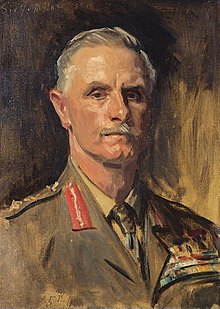George Milne, 1st Baron Milne
George Francis Milne, 1st Baron Milne GCB , GCMG , DSO (born November 5, 1866 in Aberdeen , Scotland , † March 23, 1948 in London ), was a British field marshal and chief of the Imperial General Staff from 1926 to 1933 .
Life
Milne attended high school in Aberdeen and the Royal Military Academy in Woolwich . In 1885 he joined the Royal Artillery and took part in the suppression of the Mahdi uprising , where he fought in the Battle of Omdurman . During the Second Boer War , Milne was appointed adjutant general to Lord Kitchener , and on November 1, 1900, he became a lieutenant colonel . Milne was awarded the Distinguished Service Order for his services in the Boer War .
In 1905 he married Claire Marjoribanks, the daughter of Sir John Nisbet Maitland, 5th Baronet. On November 1, 1905, he was promoted to colonel and became a general staff officer in the 46th Division.
After the outbreak of World War I , in July 1914, Milne became the artillery commander of the 4th Division, which was commanded by General Thomas D'Oyly Snow . With her he took part in the Battle of Le Cateau , the First Marne Battle and the First Aisne Battle . In October 1914 he was promoted to brigadier . In January 1915 he was Chief of Staff of the III. Corps of the 2nd Army in the Ypres area , on February 23 he was appointed major general. In July 1915 he became commander of the 27th Division, which went to Saloniki in November . Milne took over the leadership of the XVI. Corps, which was subordinated to the French General Maurice Sarrail . In January 1916 he became commander of the British Salonika Army and on May 9, 1916 he was promoted to commander in chief of the British troops on the Salonika Front . William Robertson , the Chief of the Imperial General Staff, had no intention of engaging in combat here. It was not until April 1917 that Milne was able to start an offensive on Lake Doiran, which was unsuccessful and resulted in heavy losses. Only in September 1918 could Bulgaria be forced to surrender.

At the end of 1918 he took over the management of newly landed British expeditionary troops on the Black Sea and in the Caucasus region. After the collapse of the Ottoman Empire, he tried to enforce British interests through interventions in Batumi and Baku . In March 1920, Milne took over the British occupation forces in Istanbul . Here he was also appointed full general . In 1922 he became General Officer Commanding of the Eastern Command. Milne was Chief of the Imperial General Staff from 1926 to 1933 and was promoted to Field Marshal on January 30, 1928. Between 1933 and 1938 he held the post of constable of the Tower .
In June 1933, Milne was raised to hereditary nobility with the title of Baron Milne of Salonika and Rubislaw in the County of Aberdeen . During World War II , he served in the Home Guard . When Milne died in 1948 at the age of 81, his title passed to his son George Douglass .
Web links
| predecessor | Office | successor |
|---|---|---|
| Bryan Mahon | Commander in Chief of the British Salonika Army 1916–1918 |
- |
| Henry Horne, 1st Baron Horne | Commander in Chief of Eastern Command 1923–1926 |
Sir Walter Braithwaite |
| Frederick Rudolph Lambart, 10th Earl of Cavan |
Chief of the Imperial General Staff 1926–1933 |
Archibald Montgomery-Massingberd |
| New title created |
Baron Milne 1933-1948 |
George Milne |
| personal data | |
|---|---|
| SURNAME | Milne, George, 1st Baron Milne |
| ALTERNATIVE NAMES | Milne, George Francis Milne 1st Baron (full name) |
| BRIEF DESCRIPTION | British Field Marshal and Chief of the Imperial General Staff (1926–1933) |
| DATE OF BIRTH | November 5, 1866 |
| PLACE OF BIRTH | Aberdeen |
| DATE OF DEATH | March 23, 1948 |
| Place of death | London |